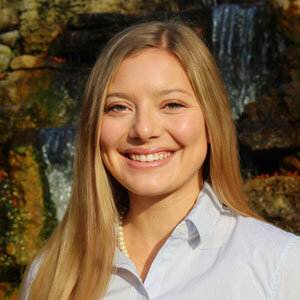
Dinnertime Discussion with the Arnns: The Good
Written by Corinne Prost
Hillsdale College students are posed with a particular question throughout their four years of study. It may float around in the form of a joke, ping-pong between classmates in a serious debate, or for the lucky few, the college president himself may pose it as a test of your knowledge on the occasion that he strolls through the student union. That question is:
What is the good?
Hillsdale students needn’t fear graduating without getting to answer this question. At the very least, they’ll have an opportunity to answer it at one of Dr. Arnn’s senior dinners.
Once a year, College President Larry Arnn and his wife, Penny, mail invitations to the graduating class for a reception with drinks followed by a formal, catered dinner at their home. In my experience, the embossed blue stamp of that paper invitation was the final confirmation that I was nearing the last few weeks of my collegiate career.
The formal dining room at Broadlawn is as true-to-form as a modern addition can be: the crown moulding, windows, artwork, and furniture are classic and presidential. Guests seat themselves, with playful encouragement from Dr. Arnn to diversify the seating arrangement between professors and students. Then, in my case, Dr. Arnn spotlighted people according to their skills: one to give a toast, another an opening prayer, and another a benediction.
The usual conversational topics of post-graduate plans, family background, and dreams or desires for the future circulated, and amidst all the usual hullabaloo of laughter and serious inquiry, the anticipated, more serious question would migrate and hover over each table as Dr. Arnn moved around the room.
It is a difficult question to answer: what is the good? Because if not answered carefully it can become subjective. Determining what the definition of good is prompts another question: who gets to set that standard? If it’s up to us, then it becomes arbitrary and therefore unfair to apply to others who might have a different “feeling” about what is good.
Furthermore, what we categorize as “good” isn’t necessarily what is good. For example, Romans 8:28 shows how good is still evident though the apostle Paul is being persecuted and stoned, and later Peter is imprisoned and tested. Within a more secular mindset, achieving fitness is good despite pain and discomfort during physical training. The back and forth of individual opinion does not add up to any one answer on the matter. What we consider good is usually what benefits us. However, I propose that the good is answered well by Jesus in Matthew 19:17:
“And he said to him, ‘Why do you ask me about what is good? There is only one who is good. If you would enter life, keep the commandments.’”
The bubbly laughter at my table simmered considerably when Dr. Arnn approached. Each of us exchanged some pleasantries and introductions, after which Dr. Arnn leaned back in his chair, hands folded, and asked his famous question (or infamous, depending on whom you ask). When I proposed Matthew 19:17, heads swiveled between him and me.
He smiled and immediately asked, “What is God?”
None of us had a complete answer to the question. Each of us offered several characteristics, but together we came nowhere near summing up a whole. “Justice,” “mercy,” and “love” were part of the list. Dr. Arnn was pleased but not satisfied with our answers, and we were relegated to the role of audience members in an impromptu lecture about discovering what it means for something to be “good” based on God.
So, while Hillsdale students may believe that there is one answer to reveal the truth inspiring the question, the reality of Dr. Arnn’s tenured riddle is that it is a locked door. My answer is the key to open it, but behind that door is yet another, and on it a new riddle necessitating a new key.
Before he left our table, he concluded his lecture by suggesting that we read Summa Theologica by Thomas Aquinas. We laughed—his parting gift was more homework! However, his advice emphasized another purpose for hosting the annual senior dinner with faculty. Seniors should realize that learning does not end once you hold the diploma in your hand. It is a lifelong journey of fleshing out the answer to the real question of who God is from the vantage point of our human experience.
When each of us shook Dr. Arnn’s hand to thank him, I was grateful I’d chosen to attend the dinner, if only for the fact that I’d gained a new question to study—one that might take a lifetime to answer.
 Corinne Prost, ’19, is an American studies major and rhetoric minor. She dreams to one day own a library so extensive that it rivals the one from Beauty and the Beast.
Corinne Prost, ’19, is an American studies major and rhetoric minor. She dreams to one day own a library so extensive that it rivals the one from Beauty and the Beast.
Published in October 2019